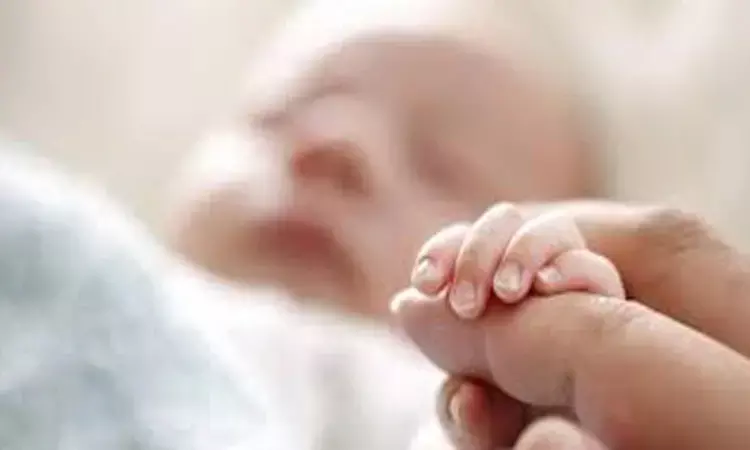- Home
- Medical news & Guidelines
- Anesthesiology
- Cardiology and CTVS
- Critical Care
- Dentistry
- Dermatology
- Diabetes and Endocrinology
- ENT
- Gastroenterology
- Medicine
- Nephrology
- Neurology
- Obstretics-Gynaecology
- Oncology
- Ophthalmology
- Orthopaedics
- Pediatrics-Neonatology
- Psychiatry
- Pulmonology
- Radiology
- Surgery
- Urology
- Laboratory Medicine
- Diet
- Nursing
- Paramedical
- Physiotherapy
- Health news
- Fact Check
- Bone Health Fact Check
- Brain Health Fact Check
- Cancer Related Fact Check
- Child Care Fact Check
- Dental and oral health fact check
- Diabetes and metabolic health fact check
- Diet and Nutrition Fact Check
- Eye and ENT Care Fact Check
- Fitness fact check
- Gut health fact check
- Heart health fact check
- Kidney health fact check
- Medical education fact check
- Men's health fact check
- Respiratory fact check
- Skin and hair care fact check
- Vaccine and Immunization fact check
- Women's health fact check
- AYUSH
- State News
- Andaman and Nicobar Islands
- Andhra Pradesh
- Arunachal Pradesh
- Assam
- Bihar
- Chandigarh
- Chattisgarh
- Dadra and Nagar Haveli
- Daman and Diu
- Delhi
- Goa
- Gujarat
- Haryana
- Himachal Pradesh
- Jammu & Kashmir
- Jharkhand
- Karnataka
- Kerala
- Ladakh
- Lakshadweep
- Madhya Pradesh
- Maharashtra
- Manipur
- Meghalaya
- Mizoram
- Nagaland
- Odisha
- Puducherry
- Punjab
- Rajasthan
- Sikkim
- Tamil Nadu
- Telangana
- Tripura
- Uttar Pradesh
- Uttrakhand
- West Bengal
- Medical Education
- Industry
Frequent and prolonged night waking in infants tied to maternal depression

According to recent findings, it has been observed that by 6 months, some infants have developed a pattern of frequent and prolonged night waking and the mothers of these infants appear to be at increased risk of clinically significant levels of depressive symptoms.
The study is published in the Journal of Applied Developmental Psychology.
One of the many challenges mothers face in caring for a young infant is coping with the sleep fragmentation and deprivation caused by infant night waking. Nearly all infants awaken regularly for feeding during their early weeks and months because of their need for nutrition. By 3 to 4 months, however, the majority of infants no longer physiologically require nighttime feedings, yet many continue to awaken.
Because mothers provide most of the nighttime care for infants, their sleep is often disrupted by their infants' night waking. Further, mothers are susceptible to depressive symptoms during the postpartum period. Because sleep deprivation is known to have deleterious effects on mood, the sleep deprivation produced by infant night waking may contribute to postpartum depression.
Hence, to confirm this, Katherine Hildebrandt Karraker and Marion Young from the West Virginia University conducted this study examined the relations between night waking in infants and depressive symptoms in their mothers at 6 months postpartum. The data was collected from the National Institute for Child Health and Human Development Study of Early Child Care.
A total of 1,364 mothers and infants were recruited and enrolled in this longitudinal study. The results showed that although more depressive symptoms were only weakly correlated with a higher frequency of infant waking, longer wake times, and more total time awake, the rate of clinically significant depression scores was about double in mothers of chronically waking infants in comparison with mothers whose infants did not awaken during the night.
Hence, it was concluded that "by 6 months, some infants have developed a pattern of frequent and prolonged night waking. Mothers of these infants appear to be at increased risk of clinically significant levels of depressive symptoms. Educating mothers about how to encourage infant nighttime sleep and how to deal with the sleep deprivation that can result from infant night waking such as through good time management and brief naps may alleviate potentially deleterious effects on parental and infant functioning and prevent the development of long-term mental health problems."
Dr. Nandita Mohan is a practicing pediatric dentist with more than 5 years of clinical work experience. Along with this, she is equally interested in keeping herself up to date about the latest developments in the field of medicine and dentistry which is the driving force for her to be in association with Medical Dialogues. She also has her name attached with many publications; both national and international. She has pursued her BDS from Rajiv Gandhi University of Health Sciences, Bangalore and later went to enter her dream specialty (MDS) in the Department of Pedodontics and Preventive Dentistry from Pt. B.D. Sharma University of Health Sciences. Through all the years of experience, her core interest in learning something new has never stopped. She can be contacted at editorial@medicaldialogues.in. Contact no. 011-43720751
Dr Kamal Kant Kohli-MBBS, DTCD- a chest specialist with more than 30 years of practice and a flair for writing clinical articles, Dr Kamal Kant Kohli joined Medical Dialogues as a Chief Editor of Medical News. Besides writing articles, as an editor, he proofreads and verifies all the medical content published on Medical Dialogues including those coming from journals, studies,medical conferences,guidelines etc. Email: drkohli@medicaldialogues.in. Contact no. 011-43720751


